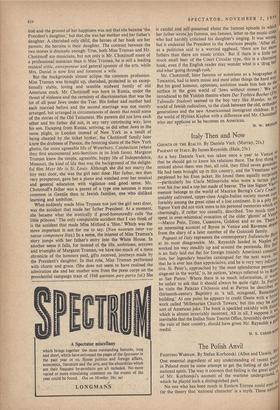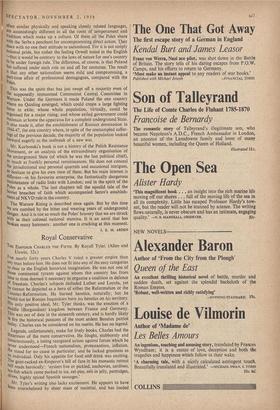The Polish Anvil
FIGHTING WARSAW. By Stefan Korbonski. (Allen and Unwin,- 105) ONE essential ingredient of any understanding of recent eveill.0 in Poland must be some attempt to get the feeling of the P°Iiiti national spirit. The way it conveys that feeling is the great qua '10 of Mr. Korbonski's account of the wartime underground which he played such a distinguished part. II No one who has been much in Eastern Europe could ever. to for the theory that 'national character' is a myth. These nation
Often similar physically and speaking closely related languages, are astonishingly different in all the roots of temperament and tradition which make up a culture. Of them all the Poles share With the Serbs a penchant for uncompromising direct action. They share with no one their attitude to nationhood. For it is not simply national pride, but rather the feeling Orwell noted in the English that it would be contrary to the laws of nature for one's country to be under foreign rule. The difference, of course, is that Poland has suffered under such rule on and off for centuries. The result is that any other nationalism seems mild and compromising, a Part-time affair of professional demagogues, compared with the Poles.
This was the spirit that has just swept off a majority even of the supposedly immunised Communist Central Committee in Warsaw. Under the Germans it made Poland the one country where no Quisling emerged; which could create a large fighting force in aile; whose whole population, virtually, could be organised for a major rising; and whose exiled government could Maintain at home the apparatus for a complete underground State. It also made it, after the establishment of Russian domination in 944-47, the one country where, in spite of the unexampled suffer- ings of the previous decade, the majority of the population looked forward eagerly to the outbreak of a new war.
Mr. Korbonski's book is not a history of the Polish Resistance Movement, or an analysis of the extraordinary organisation of the underground State (of which he was the last political chief), So much as frankly personal reminiscences. He does not conceal the jurisdictional and personal quarrels and occasional intrigues, Or hesitate to give his own view of them. But his main interest is d fferent—in his favourite enterprise, the fantastically dangerous Maintenance of radio links with London; and in the spirit of the Pules as a whole. The last chapters tell the squalid tale of the Soviet breaches of faith which accompanied Serov's establish- Ment of NKVD rule in the country.
The Warsaw Rising is described once again. But by this time We are numbed by the bitter and wearing years of underground danger. And it is not so much the Poles' bravery that we are struck With as their colossal national stamina. It is an anvil that has broken many hammers : another one is cracking at this moment.
1. E. M. ARDEN



































 Previous page
Previous page